LIBRARY ZINE!
VOICES ACROSS THE NEW YORK PUBLIC LIBRARY
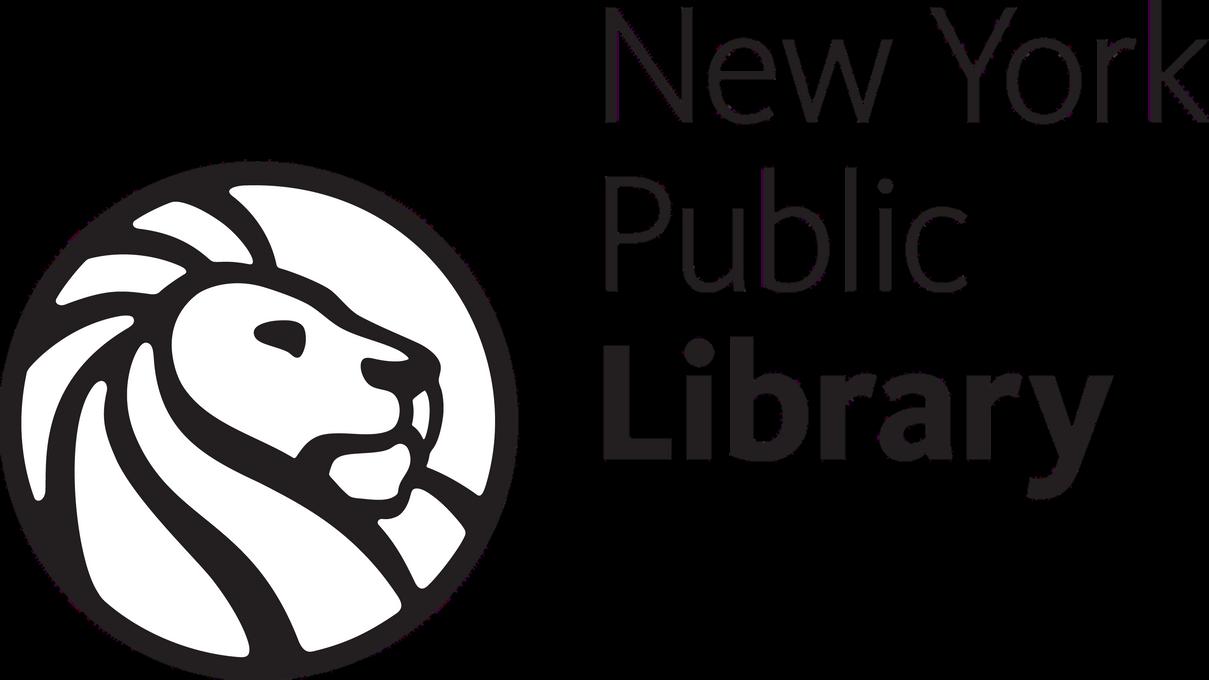
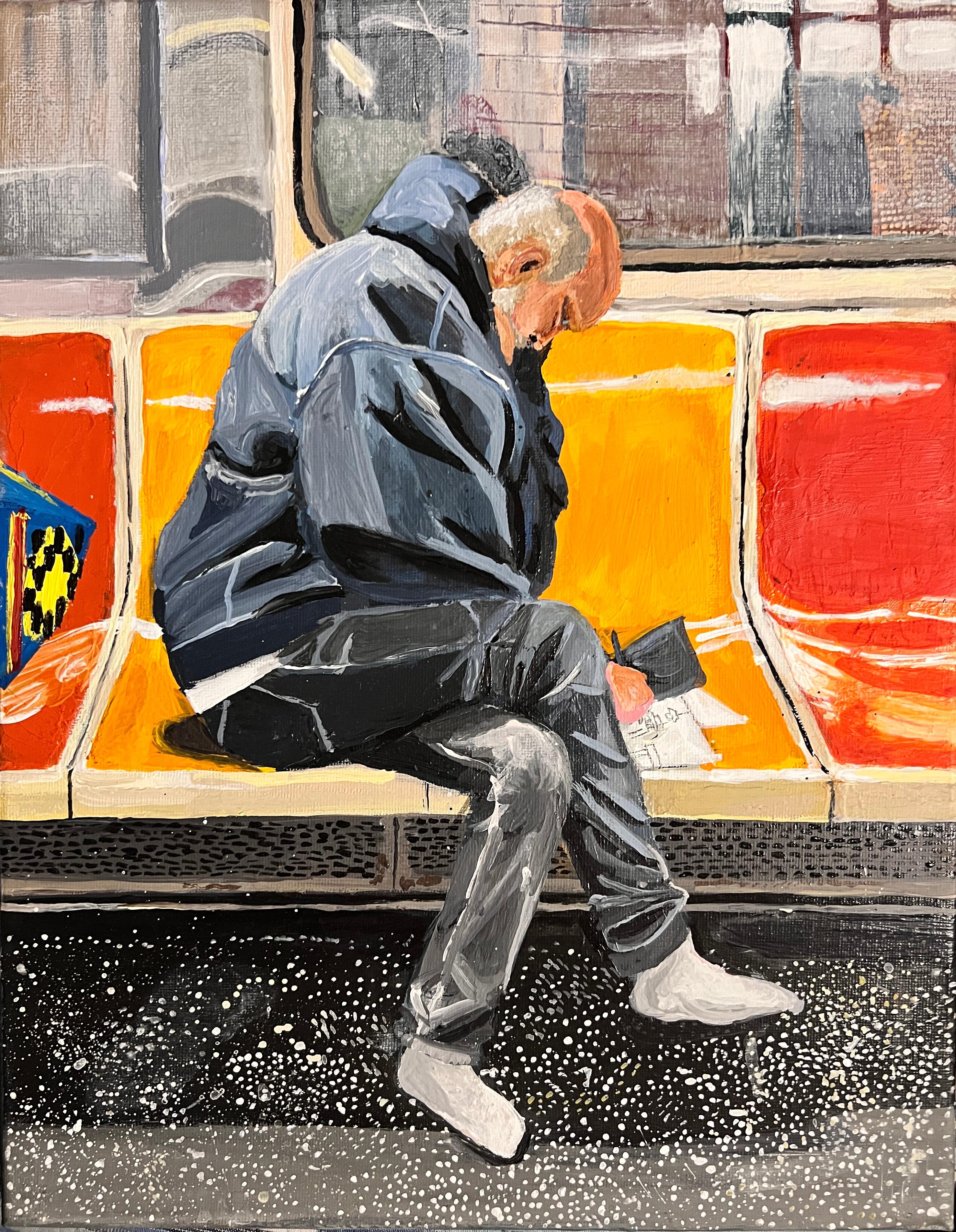
V O L U M E 6 2 O 2 2
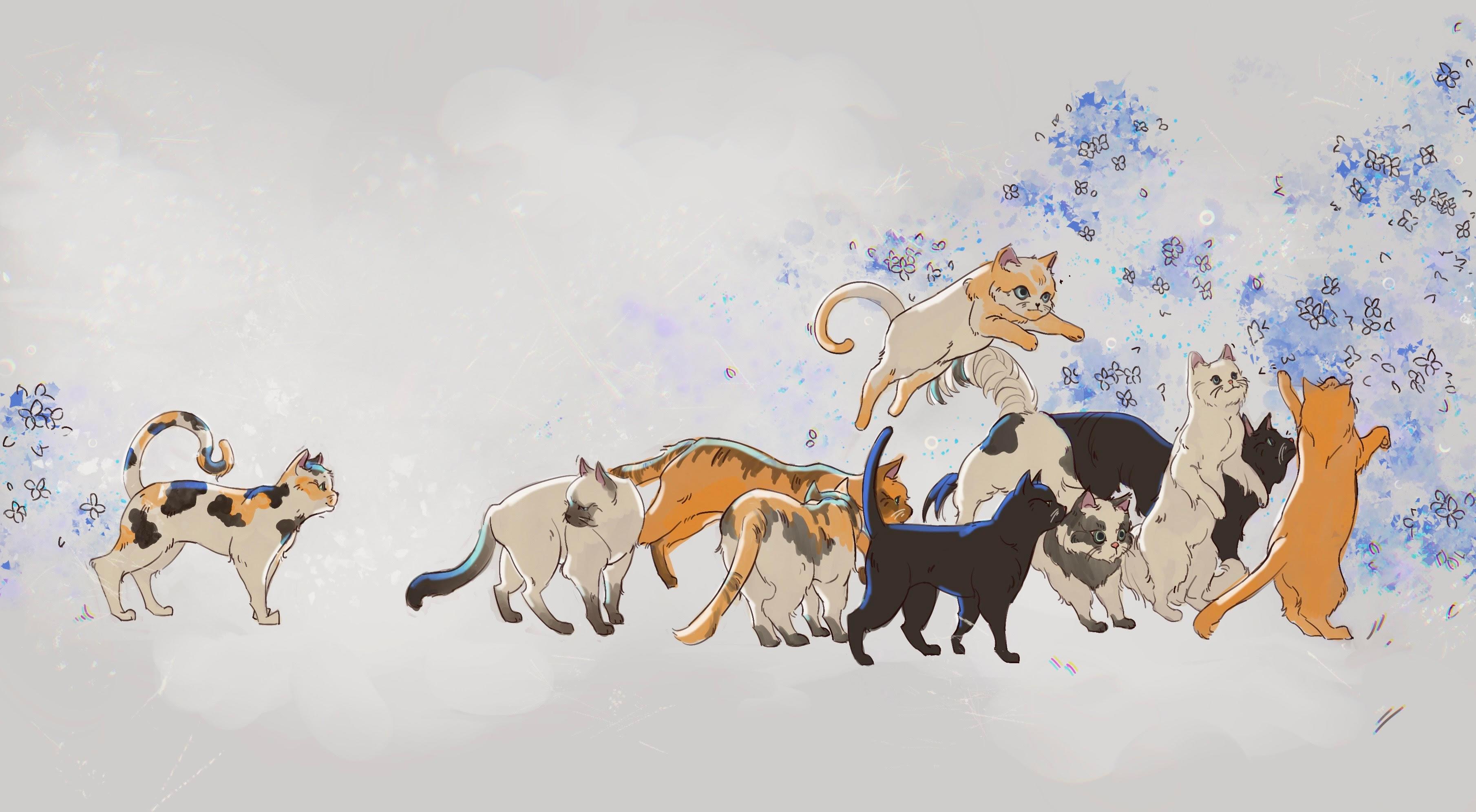
CONTENTS 3 DEAR READER 4 POETRY 15 SHORT STORIES/ESSAYS 30 ARTWORK 45 MEET THE EDITORS 48 OUR NEXT ISSUE 49 SUBMISSION GUIDELINES 50 THANK YOU LIBRARY ZINE! L I B R A R Y Z I N E ! • 2 0 2 2 I S S U E • 2 Lost and Found by Jasmine Chen
Dear Reader,
We as New Yorkers are constantly in the process of re-creating our city, and the past few years have shown that time and time again. Beloved businesses are shuttered, neighbors move away, children grow up and leave home, and many places and experiences are necessarily lost to the sands of time. However, we are ever resourceful and ever innovative, and we find new joys constantly. Whether we are exploring a new park, discovering a new hobby, or simply ushering in a new era of our own lives, we find delight, however small, in all the corners of our city. This year’s Library Zine theme, Lost/Found, reflects all of these experiences in various literary and art forms.
We would like to acknowledge all of the creators who submitted their work to our zine this year. There would not be a Library Zine without the brilliance and passion of the writers, poets, and artists who make it the dynamic anthology that it is. We would also like to thank you, reader, for taking the time to connect with us and your community through reading and experiencing the works in our zine You are also part of what makes the Library Zine special.
As we close out the year, we invite you too to reflect on what you have lost and found this year. It is our most sincere hope that whatever you have let go of and whatever you have discovered brings you the most joy and peace as you move into the new year.

Volume 6 EDITORIAL TEAM
Baldwin Adult Librarian Stavros Niarchos Foundation Library
Rhodes Young Adult Librarian Wakefield Adena Gruskin Adult Librarian Epiphany Victoria James Adult Librarian Stavros Niarchos Foundation Library Tabrizia Jones Young Adult Librarian Pelham ParkwayVan Nest Sincerely, The NYPL Zine Committee L I B R A R Y Z I N E ! • 2 0 2 2 I S S U E • 3
Dear Reader,
Liz
Whitney Davidson-
POETRY
Here you will find poetic interpretations of this year's theme where poets determine that "Lost/Found" isn't as black and white, up and down, or as opposite as one may seem.
Shulamit H. Adler Sueño Shulamit H. Adler Simple
on the black LP Almeida plucked his dream over and over until you perfected it and the finger-picking and the bottleneck slides we were all in teens in harmony on the old chintz sofa in the resonant basement singing beyond dreaming as if we had forever
Let us make all the wars, world wars. Make them ours
All the refugees our sisters and parents. All the soldiers, our brothers
And so our responsibility mine and yours: Brothers, to shelter. Wars, to end.
P O E T R Y
L I B R A R Y Z I N E ! • 2 0 2 2 I S S U E • 5
Mayana Ashley-Carner
i always think it’s still january that the leaves on the trees are still dust and the footprints in the snow lead up to the back door of a house that is not mine. and when i remember the birds cawing through the sky i scream at them to flap their wings while they can before the ice thaws
i look out at the backyard through my window shuffling papers between my hands of rippling silk and written on them are not childish fabrications but garish wounds where the needles rip through the skin and lying naked the hanging chrysalis makes its wound known by slowly turning in the wind
maybe along the streets this whole time there were tombs that held your brothers i kept thinking this, brothers and how they walk next to each other with their backs turned towards the frowning hills and to try and get more out of the world than what it wants to give me i keep thinking of the thin, filmy membrane that covers an open space or an illness and how its diaphane oils and glistening visions entice me more than to walk out into the street and pretend i have nothing to ask of the city
i forget you can see in through the window. i forget my meanings escape me when i enter the bustling station where the oracle is sitting amongst the construction workers and businesswomen and college students waiting for the train that will take them home and i look away from him, ashamed because i know what he’s going to say
P O E T R Y
January L I B R A R Y Z I N E ! • 2 0 2 2 I S S U E • 6
Mayana Ashley-Carner The End of the Summer
you said you slept on the couch at the hospital because you didn’t want to feel like a patient. that’s what i thought, you hearing me out of the silence, was our secret code: the language in your philtrum, my blood all over your hands. everything i am is weeping. i don’t know how to tell you about it. i don’t know what it is.
i try to find you every day, in the small things i do, the fingers i twist through my hair could be yours or our child’s and my sweat could be one of your hands on my skin the way i always wanted them. i’m immune to everything and something wells in me, the fondness of you, like a bruise each time i pass near your wing of the city you have broken open broad street for me, weaving it with ghosts of our footsteps. yesterday i woke up and worried i’d lost my voice the rosehips of my teeth bent backwards in a terrible joke, my tongue melted like a yearning and that i’d call out to taxicabs to take me away from here and nothing would come out but a whisper.
P O E T R Y
L I B R A R Y Z I N E ! • 2 0 2 2 I S S U E • 7
Edith Nazario A Way to Finding Myself
Take me back in time
To retrace my steps
Little
By Little
To find myself again
To find what went wrong In this long journey
To growing up
I want to go back
To when all that mattered was “When was recess?”
And not “What am I?”
Maybe after doing it all again, After Feeling every pain
Every happiness again I would realize I don't want to be who I was Maybe I would ask myself “Do I really want to do it all over again?” Maybe I would realize that I wouldn't be able to find myself again
For my future was already sealed What was done was done And now
I have to continue on with life Forwards
P O E T R Y
L I B R A R Y Z I N E ! • 2 0 2 2 I S S U E • 8
Saturn in Repose
Vanessa Y. Niu
When Saturn turns its shimmering clavicle to us
This round arcade of curiosities gliding so much like The swinging motion of childhood swings captured in movement I can almost hear the shrieking of the hinges floating above the Laughter of girlhood.
I am burning a candle and sitting on the wooden floorboards before the door Holding vigil for you, in case you decide to come back. Since you’ve left there have been ghosts in this slice of innocence
I have touched nothing in fear I would smudge the fingerprints of girl-you Baptism, no matter how clean the holy water may be, Does not save the past.
Watching Saturn with one blind eye, it is the only one that does not hurt to open, Is a death sentence, a thread around my neck, wrapping Down my shoulders, waist, wrists, shins, ankles, Which perhaps would have connected me to you Had you not burned it off yourself Cleansed of your girlhood in the Phlegethon, suspended around Saturn’s rings.
I can almost see you stepping out of its coiling fire
Like Venus emerging from the seafoam after leaving me in the Acheron. Perhaps there is a channel underground connecting the two, I cannot otherwise think of how you could have left.
My candle is nearly burnt out. I will go light another match All my matches have nearly burnt out. But I know not of worry, because this house is made of wood And I will burn it plank by plank until you come back.
P O E T R Y
L I B R A R Y Z I N E ! • 2 0 2 2 I S S U E • 9
Carlana Perla-Romualdo Nostalgia Child
What is it about the past that keeps coming to you in the loneliness of dawn?
Or in the glimpse of sunlight escaping from a cloud?
The embrace of the past can be felt when a child is giggling, Or when the wind is solemnly moving the green leaves of the trees in the gentle summer. The past feels like a pain in the chest, And you have to stay quiet, No words can come out of your mouth, They can’t escape from your heart
And no tears can come out of your eyes, They are indecent, Someone says in the other room. You try to let go, but the past decides to stay. Suddenly it tells you
My child, you belong to nostalgia
P O E T R Y
L I B R A R Y Z I N E ! • 2 0 2 2 I S S U E • 1 0
Yvette Romero LEGACY
He liked his shot of whiskey at the end of the workday The workday at the machine shop. The machine shop with the curls of silver metal in all sizes, shapes… hard, sharp, curled slivers of shine.
And she fought him every time, Every time especially since the drowning death of their only son at age 16 She would not let him forget in the whiskey. To find peace in the whiskey. To be deaf in the whiskey. Four Roses whiskey.
She became a recluse She withdrew from the world, the town, her daughters. Me. She stopped being a mother. Almost as if she couldn’t bear being a mother at the risk of losing again. Death, loss Young death, heavier loss Blame someone. Blame the husband who was with the son. It was an accident – that’s all.
So he drove to work everyday. Drove in his red pickup truck with the running boards. To work with the roll-top desk and the pin-up girl calendar above it. It was a place his wife would never come. So the pin-up girl was safe.
And the daughters went to college, married, had children. I learned to sew my own buttons And I learned to be a widowed single mother. To be a mother most of all. So that my daughter would know love, and learn to sew her buttons from me.
And now my granddaughter is brave, strong, fearless, and happy. Some things can be conquered before they are passed along
P O E T R Y
L I B R A R Y Z I N E ! • 2 0 2 2 I S S U E • 1 1
Jane Seskin ODE TO THE LIBRARY
I didn’t know quite how important you were to me until the pandemic locked away your words. No sign of long-time staff Linda, Luis, Ray – all checked out.
I remembered the years I tried on my ambitions to be a nurse like Cherry Ames, or a Nancy Drew/Hardy Boys wanna-be detective, even though I’d rather read than investigate.
What I found in the safety of your rooms was knowledge, strength, romance and recovery –so it’s difficult to admit I borrowed a book I wrote from your shelvesand never returned it! I’m sorry
P O E T R Y
L I B R A R Y Z I N E ! • 2 0 2 2 I S S U E • 1 2
Megha Sood Deciphering the Madness
I ask the night, feverishly as it rests on the caliginous back of time Like a thick rope going through the wide-open mouth of a blind wall rubbing against it, leaving marks on its existence.
Like a divine mark on the forehead after kneeling before the exalted Gods for countless times
I ask myself.
Is it ever going to be alright again?
Thinking, as I take a second glance at the empty streets of my house longing for the clickety-clack of the footsteps warming its thick cobbled skin
There is a method to this madness that I used to discover every morning looking outside my window counting hurried whispers of crowds as they move towards the station like a mass exodus
Now I long for those sights which I normally abhorred the state of the normalcy of what it was before as the light sheepishly makes its way through thin wooden slats of my bedroom window
Is it ever going to be alright again?
The pinging sound of the garbage truck backing up in an alley soft paws scratching as they dig dirt in the almost bald spot of the park joggers cladded in sweaty bodies heaving to take in another sliver of breath
Is it ever going to be alright again?
I look at puny finches weaving a nest in the oak outside my apartment, as they decipher this reigning madness carefree weaving home for their future self.
I say to myself, It is indeed going to be alright again.
P O E T R Y
L I B R A R Y Z I N E ! • 2 0 2 2 I S S U E • 1 3
Megha Sood Needs and Wants
Countless lessons, dreams which never reached their fruition scars which I held as my armor small puny moments in my life that served as my guiding beacon These were moments of weakness of gratitude, of love, of belonging hunger and of acceptance
Endless times I could count the teachings on the soft tips of my bony fingers recalling the night when the moon shines in its reverie safely tucked in the cleavage of light and thunder
These sublime crotcheted memories those corrugated desires an endless maze of the needs and wants, is the surreal path I traversed in life a path carved with bone and sweat lined with the sublime stories of survival
You will meet people who will make you feel like a spring blossom leaving you brimming and spilling with life. And then there will be those whose ashen sights will suck the nectar leaving you seeded with strife.
Life is nothing but a dichotomy of emotions A rollercoaster of a ride.
I cannot teach you something that you will finally learn in your own soft and nimble ways, I always say this to my son, We all have to make our own path carve through the struggles deeply seeded in our souls guiding us through the thick ashen days
I want you to remember this lesson as to stop looking at people as opportunities and give them their deserving worth they are striving so hard for.
Life will always be a struggle Look deep and connect with your heart
There is more to this mysterious life Than your mere needs and wants.
P O E T R Y
L I B R A R Y Z I N E ! • 2 0 2 2 I S S U E • 1 4
SHORT STORIES & ESSAYS
The Essayists
and Storytellers in this section truly captured "Lost/Found" by writing what inspired them, how they found their voice, and standing up for who they are and what they believe in.
A Brief Vignette for Mary Oliver: On Being Lost and Found
Belinda Farley
There is a line in a Mary Oliver essay that reads: “The scene is original and pretty as a dream.” These words are contained within “Upstream,” a collection of selected essays that Oliver published in 2016. They are thought provoking, sentence-stopping words. You ask yourself, What scene is this? You want to see it, you want to be within it. And I, I wanted to read more of the author who’d written of it. I came to this work later, after first meeting Mary in 2020 at a time when I was searching. I cannot speak for everyone but, maybe, many – it was a time when there was so much searching for what had suddenly been and became a sustained loss; It was a loss that left no thing as it was. The physical contact and proximity of societal engagement that we’d grown accustomed to experiencing was thrown into question, then halted. There was a general upheaval of all livelihood that left no being spared We would have to adapt, to practice new ways of interaction, to learn to communicate differently. And in the wake of that moment, when life as we’d once known it was changed, I unconsciously – instinctively - turned to nature.
It was as if the nature of my self intuited its own remedy: I was in want of ceremony with the phenomena of the physical world, per its most classic definition. I sought attendance amongst the plants, the animals, the landscape. The earth. That’s when I met Mary – not in person, but in a podcast I speak her name familiarly because that is how I still recall with intimacy my initial encounter with her audio interview of “On Being.” Describing in detail her career as a poet and, specifically, how nature became the subject of her oeuvre, I immediately paused to stop my tracks along the footpath I frequented during those precarious times. I made an effort to engage all of my senses I took note of the landscape Soil beneath my feet, green grass sprouting wildly in abundance about me, an occasional rustle of leaves when an anxious squirrel landed after a leap. There was water rushing somewhere nearby. I couldn’t see it, but I could hear it, faintly, as it bubbled and sploshed further afield. I was reminded of what’s first order. All of this activity I recognized as its own private symphony of existence. I found this existence to be beautiful, and humbling.
I’d often wondered during that time of uncertainty what exactly I was doing in those specific surroundings, in which I’d come to create a ritual Walking, of course Seeking, certainly I daily paced myself through choppy foliage. I thought. I watched; I tried to pay attention. Mary Oliver wrote of spiders and turtles, hawks, eels, and deer. Ponds and streams, a lot. Trees, always. Each of her poems revel quietly in observance of what can easily be taken for granted. A simple park can be stepped into and through, or provide moments of instruction
E S S A Y S L I B R A R Y Z I N E ! • 2 0 2 2 I S S U E • 1 6
It was a choice Be quiet, be observant, breathe deeply and be rewarded with the surprise of a late season butterfly exhibited alit on a stem of something colorful, and alive. Everything in nature has a reason for doing what it does. Purpose! There were lessons here to be learned. I began to reimagine the mundane as a master class.
Not everyone has a favorite poem, even less a favorite poet. As a person with more than one of each, let me say that lacking either is a deficit. I say this with confidence, and without judgment. Because the truth of it is that poetry will meet you where you are, no matter who you are, wherever you are. Just as nature will. And does.
In that same episode of “On Being,” Mary Oliver (who resides with both feet planted within each of those categories for me) said: “I got saved by the beauty of the world ” Which is the point, really Because at some point, in each “one wild and precious life” that this poet conjures for us in “The Summer Day,” we will all need saving – if only from ourselves. We may all get lost, and need to be found. And what a joy it is to recognize what we most need enunciated in the posterity of the poetic.
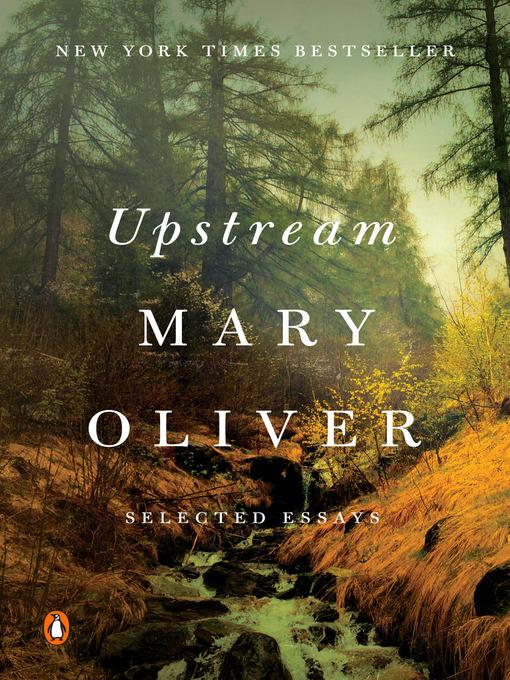
E S S A Y S
L I B R A R Y Z I N E ! • 2 0 2 2 I S S U E • 1 7
LOST AND FOUND: WOMEN’S ACHIEVEMENTS
Karen M. Resnick
I had taught business and computer skills to adults at a non-profit agency for about 39 years-retiring in 2016 only after the 80-year-old agency suddenly went bankrupt. Personally, it was a devastating loss and experience--one that I would not wish on anyone. Truthfully, I loved teaching, and I must admit that I still miss it despite the passing years
The Women Who Made New York
A few months ago, I just happened to have noticed the book entitled by Julie Scelfo on the New York Public Library's website (nypl.org). I immediately placed the book on hold; I could not wait to read it. This book unexpectedly brought back fond memories to me.
In 1985, my school director suggested at a staff meeting that we should hold a schoolwide conference to celebrate Women's History Month and asked us to recommend a theme. Since we were an accredited business school, I immediately voiced that our theme should be women in business; and that is how our school-wide March Women's History Month Conference began. I took an active role in that inaugural conference recommending that as part of this conference we should have a panel of business school graduates discuss their success in the business world which I moderated. The following year, however, that school director had left for another position within the agency. Realizing that this conference was such an important and motivational tool for our students, I took it upon myself to now coordinate and moderate the entire Women's History Month Conference in order to keep it going--which I did do for about 10 years.
In an attempt to keep these yearly March conferences fresh and interesting for the staff, students, and for myself as well, I would take it upon myself to research annually the accomplishments of different women and/or concepts and ideas that contributed to the growth of women in the business world and share that information within these Women History Month Conferences. I immediately knew from the title of the book, The Women Who Made New York, that it would bring a past interest and desire (to learn further information about women's achievements) back into the forefront for me. This book did not disappoint--it was written in a very interesting and easy-to-read format, was well documented, and managed to discuss extremely important women's contributions to New York City.
E S S A Y S
L I B R A R Y Z I N E ! • 2 0 2 2 I S S U E • 1 8
As it turned out, many of the women's names were familiar to me, but I was surprised to learn that I knew very little details about these individuals; others were completely unknown to me who certainly deserved to be recognized for what they had achieved. Personally, out of all the women discussed in the book, the following four women stood out to me:
As of 1851, she became the first female doctor in the United States. She had a difficult time establishing herself in New York City. However, in 1857, she was able to establish a hospital--which still exists today as part of New York-Presbyterian/Lower Manhattan Hospital. She was responsible for establishing a training facility for female doctors. She expanded that in 1868 to become a medical college for women--making it the first four-year medical program in the United States!
These two women were instrumental in their roles in education. Despite the fact that I had taken numerous education courses, had attended New York City public schools all the way from elementary through graduate school (CUNY), and previously had taught in the New York City public high schools and at a CUNY community college, I had no idea (and it was astounding to me to learn) that at one time in New York City's history that it was a novel idea that all New York City children should be entitled to free public education "regardless of sex, race, creed, or their parents' finances or religious observance." In addition, the author included a brief (and interesting) history regarding the establishment of the New York City Board of Education, as well as the Normal School and why and when Hunter College was established.
The name of Frances Perkins was very familiar to me I had known that she had been President Franklin Delano Roosevelt's Secretary of Labor. However, I did not know that that had given her the distinction of being the first female in our nation's history to serve in a presidential cabinet. After she had studied the rise of industrialism at Mount Holyoke College and visited a mill in Connecticut, she concluded that the widely held view that poor people were nice people but their predicament was caused by laziness and alcohol was untrue She realized that the women and children she had observed at the mill were hard working and that their bosses, in fact, were taking advantage of these workers. As a result, it became her life's mission to ameliorate these "slave-like working conditions." I knew of the Works Progress Administration (WPA); however, I had no idea that Frances Perkins had created it nor that she was behind the establishment of a 40-hour work week, the minimum wage, abolishment of child labor, unemployment compensation, and social security--things that I and many other workers have personally benefited from and simply taken for granted with no regard as to who was responsible for implementing them. It is amazing to me that not only did she have the vision as to what was needed to be done to improve the working world, but that she had actually succeeded to see those changes put into effect and become standard operating procedures.
E S S A Y S
L I B R A R Y Z I N E ! • 2 0 2 2 I S S U E • 1 9
Dr. Elizabeth Blackwell: Catherine Bowne Murray and Julia Richman: Frances Perkins:
This book added to my knowledge and pride of women's accomplishments--not only for what they had done for New York City but also for society at large. Due to the fact that the author, Julie Scelfo, was able to uncover the names and accomplishments of these phenomenal New York City women, I feel that it behooves all of us New Yorkers to read so that these women's legacies will remain alive and be appreciated--and not be lost to future generations
The Women Who Made New York
E S S A Y S
L I B R A R Y Z I N E ! • 2 0 2 2 I S S U E • 2 0
The Mutt and The Half-Blood Prince
Shahab Gharib
The Dean's office was beautiful. The first thing that would usually come to a visitor's attention would be the huge window facing the park behind the school building Or probably the massive antique dark wood desk with its green leather inlay. But I was completely mesmerized by the huge dark oak library case filled with books in the most beautiful bindings. Who would have thought? Good old Dean Demetrios Dunkirk was a bibliophile! I love books. Antique books. Vintage books, small books, huge books, any books! Struggling with my feelings torn between jealousy and pure joy, I was rudely pulled out of my thoughts by exactly him, my new hero Dean Dunkirk.
"Really? You again? Twice in one week? What is going on with you? Are you mad? How dare you become such a disappointment?" Obviously, he didn't say it exactly like that, but that is what I heard.
"Ah, ahem.... which question do you want me to answer first? Or shall I - as it is a well-established protocol in such a situation - first explain myself? I would fully understand when in such an emotional crisis, this question slipped your mind for a second, Dear Dean."
Worked like a charm! Dean Dunkirk was well known for enjoying a good argument presented in a polite and eloquent way.
"Well, agreed Let's hear it then "
Now comes the tricky part. Presenting my case, giving the impression of being responsible and willing to accept the consequences, but still making certain of my total innocence. What I really wanted to say is something like: these f.... a...., I hate them, I wish them dead or rotting in the lowest of the low hells.
I decided on a more reasonable approach: "I was walking the hallway with my friends Sam, Rachel, and Jared, when two guys - I only vaguely know - started yelling at me that I am a f…. terrorist, I should be hanged or decapitated like the terrorist pigs do with our soldiers. I was more than surprised and did not really know anything else to answer than a whispered, befuddled: 'What?' Before I could think about anything else, one of the guys threw something at me, then the other one flipped a garbage bin I started yelling, "What the hell is wrong with you?" when the first punch flew directly into my face. Out of reflex, I grew up in a boxing gym; I slipped to the side and counteredthe guy lay flat immediately. The second attacker tried to kick me with a well-executed side kick, but again I was lucky, lifted my leg, and could punch him to the chin. And that is what happened."
The Dean looked astonished. He was told I had attacked the boys out of the blue. I assured him that the witnesses would confirm my description as well as there should be security camera footage
S H O R T
S T O R I E S
L I B R A R Y Z I N E ! • 2 0 2 2 I S S U E • 2 1
I am not a terrorist. Rarely high school kids are. Yes, my father is of Persian descent, but even he is only half-Persian The maternal side is German And that leads us directly back to the Dean
"You were here three days ago because two African-American students were in a fight with you, claiming you used profane and racist insults and attacked them. They called you a right radical skinhead," he recounted, confused.
I sighed
I can tell you that it is absurd to call me a racist just because I have short hair and wore a military parka that day. I wanted to tell him how I felt about this. How I was hurt, embarrassed and angry; and sad; and confused; and I don't even know all my feelings. How can you not see that I am the victim? I thought. How could you possibly react that way? I have been an honor roll student all of my life My family and I volunteered on all school occasions Why do I even have to defend myself? Why?
Being called a skinhead German racist and a Muslim murdering terrorist in three days and on top of that, being attacked by students violently made my blood boil again, and I needed all my concentration to focus not to explode.
I wanted to storm out and go home. I was sick of this. Why should I force myself to be subjected to all this torment? However, the Dean looked at me, waiting for an explanation. I took a deep breath and spoke, praying for my voice to stay steady.
"That is a false accusation. I never said such a thing. Why would I? I am part African and was regarded as dark-skinned when I lived in Europe and felt the oppression there I would never spread more hate."
The Dean looked even more confused, but I saw in his eyes that he believed me.
"Very well. You may go, but please try to stay out of trouble."
I wanted to yell that I had never done anything wrong in the first place. Why was he telling me this? Tell them! But instead, I smiled.
"Yes, sir."
I turned and left, still yearning for the chance to be treated as an equal I knew the Dean personally had nothing against me. It was just that he had never been in my shoes. He could not imagine what I felt like simply because he never had to. I put the thought out of my mind and began to walk home. I stepped off the trimmed school grass and onto the rough ramble road leading to the bus stop. Dust kicked up behind me as I continued my slow and dull tugging.
S H O R T S T O R I E S L I B R A R Y Z I N E ! • 2 0 2 2 I S S U E • 2 2
As I got to the bench, I saw someone sitting there. It was an older man whom I had seen walking around campus before. I sat down next to him and caught the faint whiff of old books. I looked at the man and saw an old leather-bound book tucked into his jacket. He looked up at me and smiled.
"Can I help you, sonny?"
His voice sounded like the turning of pages.
"Sorry to bother you. I was just admiring your book."
"No bother at all. Thank you. Would you like to have it?"
I was completely taken aback.
"Oh no, I couldn't."
"Well then, just take a quick peek," he said and handed it to me.
It was a beautiful edition of a book I had never heard of. It was called "The Return of the Half-Blood Prince" by Charles Bringwood. The binding was chipped, but the golden letters could still be seen on the spine. The red leather binding was well-oiled and soft. I opened it and saw that the creamcolored pages were covered in a language I had never seen before. I must have looked confused because the man said:
"The language is Farsi."
It took me a moment to remember which country used Farsi. Then it hit me: Iran! I turned to him.
"What is it about and why is the title in English?"
Nodding as if he had heard the questions before he answered:
"The author was half Persian - half English, and that is why the title is in English. As for what it is about, you will have to read it yourself to find that out."
The bus pulled up, and the doors opened I wanted to hand him the book, but he pushed it back into my hands.
"But I can't read Farsi," I spoke.
"It's just like any other language. All it takes is practice." With that, he got up and boarded the bus.
E S S A Y S
L I B R A R Y Z I N E ! • 2 0 2 2 I S S U E • 2 3
I looked at him befuddled. As the bus pulled out of the station, I saw him wave back to me. I was very unsure of how to proceed. No one I knew spoke Farsi. My father could say a few words but barely would be of help. My uncle and grandpa were overseas, and the only way to talk to them would be over facetime. Once I got home, I immediately tried to find a Wikipedia plot summary or an English version but turned up nothing. Abe books, eBay, even Amazon - no seller had any information or a copy Sighing, I tried to teach myself Farsi I bought a few handbooks and poetry collections in order to start slowly. It took months of work, but I thought I was ready by the time summer rolled around. I opened the book and wanted to skip the introduction, as I always do. However, this was not a run-of-the-mill introduction. It was not about how the book was written but about the author himself. He was born in London and grew up having great issues with his identity. Although Iran was viewed more highly back then, he was often called names like "carpet seller." One day, he met another Persian who told him a story about a Persian king fighting to free Iran from the grip of a sorcerer who came from abroad. The story inspired him so much that he took a leave of absence from his job as a store clerk and began to write. Feeling confident because I had read all of this and because the author was very relatable to me, I started to read. At first, the book was tedious, but after the first 50 pages, I barely had to think anymore. My dad made me stop around midnight, which was very difficult for me. The minute I woke up the next morning, I kept reading. I continued this cycle for another two days before I finished the book
When I turned the last page, I did not feel the usual sadness of having finished a great book. Instead, the ending filled me with hope. In simplest terms, the book is about a young orphan whose mother is Persian but whose father was a soldier from some unknown country. This, combined with his poverty, make him incredibly unpopular among the other children. One day, he overhears a conspiracy to kill the Shah and reports it, but no one believes him When the Shah is killed, he is then blamed. Filled with anger, he runs away for years. While abroad, he makes a fortune and becomes known as the half-blood prince. When he returns after many years, no one recognizes him until he reveals his identity. Having shown all his former tormentors his worth, he leaves and refuses a chance to marry the princess because he does not need their appreciation or congratulations.
When I had finished reading, school was just starting up again I returned to campus and walked to the bus stop where I had met the old man. I waited for weeks until one day, he showed up. As he walked up, I stood and handed him the book.
"Thank you for loaning it to me," I said, beaming.
"You read it?" he said, sounding confused
"It took some time, but I finished it, yes."
He nodded, impressed.
"My congratulations Thank you for returning it "
E S S A Y S
L I B R A R Y Z I N E ! • 2 0 2 2 I S S U E • 2 4
With that, he boarded the bus and drove off. I was hoping to talk to him some more, but he was gone. He did not show up at the bus stop for the next two months. Then, just as I was prepared to stop showing up, I saw him sit there with a package in his hands. As I approached, he handed me the package.
"You deserve this, Mr Gharib " I looked at him quizzically and opened it. Inside was a beautifully bound edition of the book. It was different but even better as it had illustrations. I opened it and saw an inscription on the first page: "For the half-blood prince inside you. - C. Bringwood". My jaw dropped.
"How did you find this?" I asked, but the old man was gone. I stood there holding the book for what seemed like ages Then my bus started to approach From behind me, I heard someone yell:
"Hey mutt, do something good for once and hold the goddamn door."
Without turning around, I said: "I'm not a mutt I'm the half-blood prince "
E S S A Y S
L I B R A R Y Z I N E ! • 2 0 2 2 I S S U E • 2 5
Diana Hernandez Perdido y encontrado
¡Qué mucho perdimos! ¡Qué mucho encontramos! Las noticias parecían lejanas, pero se sentían cada vez más cerca Mientras observaba la situación que se desarrollaba en una lejana ciudad de China, veía el sufrimiento y la desesperación y no podía dejar de pensar en el término globalización que tanto se usa en esta década ¿Qué distancia nos separa?, con toda la tecnología, con la oportunidad de viajar de un momento a otro, porque nos sentíamos tan seguros de que no nos afectaría a nosotros No se la respuesta, sé que comencé a presentir que nos alcanzaría más rápido de lo que imaginamos y así fue. Antes de que lo entendiéramos, las puertas se comenzaron a cerrar, llegó la noticia que a principios de marzo las bibliotecas estarían cerradas ¿Por cuánto tiempo? No sabíamos, sé que muchos pensaron que quizás dos semanas bastarían para resolver el problema de esta enfermedad que nos atacaba llevándose todo lo que conocíamos. Vimos alejarse nuestro trabajo, nuestra familia, nuestro entorno, las puertas cerrándose en todos lados y nosotros solo con el sabor amargo de la incertidumbre de no entender bien lo que estaba pasando. Debo confesar que muchas veces en los días más ocupados en la biblioteca pensaba ojalá estuviera vacía. Mi deseo se había hecho realidad y estaba comenzando a crecer un desasosiego en la boca del estómago diciéndome pasara más tiempo del que crees cómo efectivamente ocurrió. De pronto comencé a ver las computadoras vacías, las sillas vacías, esas sillas en las que se sientan tantos sueños…. de un nuevo trabajo, de una nueva oportunidad, de ver una película que no he visto, de conectar con el mundo de afuera por que el nuestro es muy pequeño o triste o violento, de un nuevo lugar para vivir, de la respuesta a una necesidad, de llenar un formulario para poder poner comida en nuestra mesa, de conectar con amigos que están a la distancia, de resolver situaciones, de ver los resultados de mis exámenes, de esperar la carta de la universidad que deseo, de aplicar para el examen de ciudadanía, tantas cosas, esperanzas y sueños. Las mismas sillas que de pronto quedaron vacías cuál petición contestada de mis días de ansiedad. Ya lo dice el dicho ``cuidado con lo que deseas por que se te puede conceder”. De pronto perdimos mucho y algunos todo. Perdimos el abrazo, el contacto, el saludo y la vida. Perdimos lo conocido por lo nuevo, perdimos los rostros y encontramos las mascarillas. Perdimos la tranquilidad y encontramos el miedo, la incertidumbre. Perdimos el “prueba que está bien rico” , “dame un pedazo”, el compartir. Perdimos el “estas resfriado” por el “si estornudas estás contagiado''. Perdimos sueños, graduaciones, fiestas, celebraciones, risas, alegría y vida, que muchas vidas . ¡Qué mucho perdimos!
S H O R T S T O R I E S
L I B R A R Y Z I N E ! • 2 0 2 2 I S S U E • 2 6
¡Qué mucho encontramos! Encontramos miedo, incertidumbre, desconsuelo, tristeza, desesperanza, soledad, angustia, tristeza…. que mucha tristeza. Y en medio de todo también encontramos empatía, abrazos con el alma, sonrisas en la mirada, valentía, heroísmo, fortaleza, ganas, lucha, firmeza, corazón, valor y mucha fuerza. Encontramos manos amigas, el valor de la familia, el valor de un abrazo, del trabajo, de la biblioteca llena de personas, de la esperanza, de una sonrisa, de una caricia, encontramos el valor perdido de las cosas realmente importantes. Encontramos personal médico dispuesto a dar la vida, encontramos maestros, bibliotecarios, entrenadores y muchos más aprendiendo nuevas formas de enseñar con la tecnología. Encontramos nuevas formas de comunicarnos, de sentirnos cerca, de utilizar las herramientas tecnológicas a la mano. Encontramos que podíamos hacer mucho con menos, que el trabajo a la distancia es trabajo, encontramos nuevas habilidades para desarrollar. Encontramos la sonrisa en la pantalla de la computadora, encontramos la reunión de amigos, la fiesta familiar virtual, la celebración y el abrazo a la distancia. Encontramos todo lo que necesitábamos para seguir adelante hasta que lográramos volver. No somos los mismos y nunca lo seremos, porque perdimos mucho y encontramos mucho. No somos los mismos y nunca lo seremos porque hemos cambiado, vemos como la vida no está garantizada y aprendimos que es virtual y real pero que es valiosa. Aprendimos que no todo lo que deseamos es bueno que pase, que no todo lo que se publica es verdad y que no toda la verdad se publica. ¡Las puertas se han comenzado a abrir, hemos vuelto a ver los rostros, las sonrisas quizás con un poco más de ansiedad y tristeza, pero también con destellos de agradecimiento por que la biblioteca es y seguirá siendo el lugar seguro donde me resuelven, el espacio que provee soluciones y amplia mi mundo! ¡Que placer ver la biblioteca llena!
¡Qué mucho perdimos!, ¡Qué mucho encontramos!
E S S A Y S
L I B R A R Y Z I N E ! • 2 0 2 2 I S S U E • 2 7
Kristen Strmel 7 Years
Lately I’ve found myself thinking about high school. By this, I mean one day in particular: an otherwise nameless morning sometime in late May It rises up from the murk of my memory and drags me back 7 years, to 2016. The second half of senior year, a blissful set of months we students had earned the right to enjoy after wading through that past fall’s cascade of college applications. I still recall how cleanly that last year was split: the first half a churning sea of admissions essays, recommendation letters, and campus visits, sliding into the placid waters of late spring and summer, our final harbor before heading out into the open ocean.
It was gym class, probably second period. Our teacher, a broad-chested man with close-cut dark hair, had long given up on corralling us into a workout routine. The warm weather had freed us of that pretense we needed only to endure a few basic warm-up exercises before our release outside onto the track field, a pebbled red road that wrapped around the court like a giant Fruit Roll-Up. The boys played flag football and tennis in the round patch of grass the track enclosed; the girls ran (walked) laps around the field or lounged on the bleachers I had chosen the bleachers that day, accompanied by a friend I’d known since middle school.
I no longer remember the heavy whoops and shrieks the boys down in the grass would have made; the steel that would have scorched my thighs and buttocks; the 10:00AM sun blinding me. I only remember the sky, pristine blue and dappled with just the right amount of clouds. Perfect, audaciously so It could have been a painting
I might have leaned forward, pressing my elbows into my knees. Or I could have leaned back, letting the bleachers sear my neck. I will remember this, I thought. This I did for sure, with such fervor that even thinking the words now brings up, painfully clear, that sky of 7 years past.
7 years later, I don’t just remember I desire that sky as a child desires a second helping of ice cream. Not something that will kill me if I don’t get it, but powerful enough in the moment to make me yell I WANT IT NOW. But let’s be honest I don’t actually want to go back to being 17. It’s the simplicity I crave. In that May of 2016, I was one month away from graduation, three months from my 18th birthday, and three months and a week from failing my first driving test and crying the entire way home. Three months, a week, and a day from dispelling that failure from my thoughts because I was starting college at Hunter, a place I’d been enamored with since my first campus visit Until I graduated in spring of 2020, I didn’t need to worry about a thing. For the next four years, my life was set.
Swaddled in the silver cocoon of the Upper East Side, my days passed in blissful predictability. Four days a week I’d take the SIR up to the ferry, rocking through New York Harbor with my weekly readings perched carefully on my lap Then it was on to the 4 or 5 (whichever came first) and a quick, easy switch to the 6 at 42nd.
S H O R T S T O R I E S
L I B R A R Y Z I N E ! • 2 0 2 2 I S S U E • 2 8
Hunter had its own station, nestled conveniently beneath the campus. You could walk straight up the stairs onto the ground floor without ever going outside, a blessing on cold or rainy days.
I spent the hours between my classes sitting in one of two places: a relatively comfortable seat in the library, or on the floor, accompanied by my overpriced lunch. It was a lucky day indeed when the cafeteria had a place for me to sit; normally it was bloated with students the minute the clock passed noon. Generally I was consigned to floordom, sitting in the corner a floor or two above with lunch precariously balanced on my knees. I wasn’t the only one. In one of my later semesters, a girl I didn’t know would post a video exposing Hunter’s “deficiencies.” Among them was the “floor culture”, as she called it, so prevalent on campus. The words were true enough to make me crack up the first time I heard them, and to this day, sitting on any floor brings me back to the cadres of students, hunched and cross-legged, beneath Hunter’s windows
Some of my friends came to Hunter with me, though many transferred out in the ensuing years. In our first year, months before anyone left, we had a habit of flocking together on the 8th floor of Hunter’s West Building, which opened up into a wraparound terrace sprinkled with seats whose green paint was dutifully decaying. The city unfurled before us rows of squat beige apartments in the north thinned out and up into high-rises in the south The Chrysler Building, dignified and evergleaming, stood to the left. To the right, 432 Park Avenue jutted out into the sky like a mottled middle finger.
Those were simple times too, or at least a little simpler than now. Back then, being smart was enough. All I’ve ever needed was to be smart. Now I need to know things.
It’s the little things, like making a phone call without panic, pumping my own gas, cooking anything more complicated than microwaveable pizza and rigatoni with store-brand sauce. Things an adult should know, must know and must do. On the precipice of my future, I am looking again and again to the past. A time where my ability to succeed was entirely tied to the numbers on my report card, and a ceremonial diploma defined my worth. When dutifully commuting to class and emailing assignments to my professors on time meant my life was set
Everything I’ve done for the past 7 years has been designed to get me to this point, and now I’m looking back, desiring not those days themselves but the ease they possessed. All I want is that beautiful sky, beaming down on a world that made perfect sense. But I can’t go back and wouldn’t want to. I’m stuck here facing the gargantuan chasm of whatever my future holds, unable to do anything but wait and wish
But maybe my future isn’t something that needs to be filled up all at once. Day by day, step by step. That’s what I used to tell myself during the worst of COVID, when the days threatened to blur into a single churning mass. Two years later, and the road ahead feels uncertain for very different reasons. All I can do is go little by little, seeping progress into the crevices of that chasm. I hope it’s a compromise I can accept
E S S A Y S
L I B R A R Y Z I N E ! • 2 0 2 2 I S S U E • 2 9
ARTWORK
This last section contains the visual representation of the theme and nothing is alike.
While the Artists included a statement about their work, we still invite our Readers to use their own interpretation.
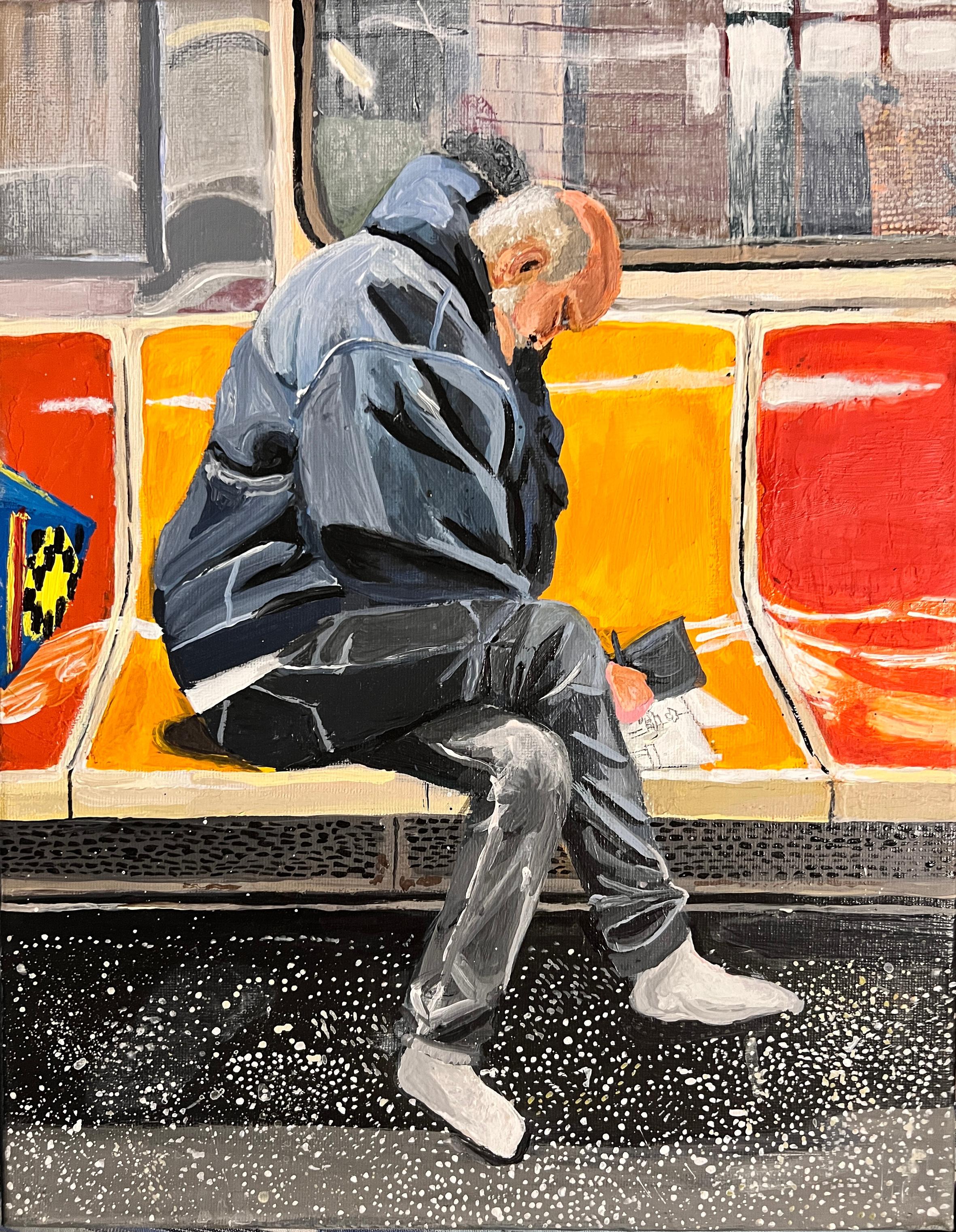
A R T W O R K Artist Spotted on the 1 Train Carlana Perla-Romualdo Acrylic on Canvas 11x 14 L I B R A R Y Z I N E ! • 2 0 2 2 I S S U E • 3 1
Artist Spotted on the 1 Train Carlana Perla-Romualdo
According to population statistics, New York City is the most populated city in the United States Yet, the majority of its habitants are the loneliest among the face of earth. Those lonely souls cross one another each day, sometimes sharing a subway wagon briefly, sometimes sitting beside each other on a bench or entering the New York Public Library branches to use a computer and connect to our modern world. Maybe the majority of these souls lost hope, the faith in tomorrow that keeps us moving towards the future. It is possible that in our daily battles, we still find the reason that makes us feel connected and more importantly, alive. I encountered this man on the 1 train on a cold February evening at Penn Station. It was freezing cold, and he was only wearing socks, a hoodie and diapers Despite his situation, what called my attention was the way he was concentrating on a piece of paper in which he was sketching. There were more people in the wagon, but it was him who called my attention. He was ferociously sketching with a pen. He didn’t care if someone like me would be observing him. In the midst of his winter, it seems he found a ray of inspiration. We tend to forget that people on the streets also were children once, they had dreams of their own. As a creative person and artist, sometimes I feel that I lose inspiration, when my winter days bury me in the cold snow, but I tend to forget that snow melts and spring will come again. Those sunshine rays will melt the snow and provide the inspiration to continue growing and creating as an artist That man on the train reminded me of that, no matter how hard your life might seem, you can’t forget who you are and what talents you possess. He was creating in front of me. I never saw that men again, but he inspired this painting and reminded me of the goals I wanted to achieve. I hope that wherever he is now, he also achieves what he wants, it’s never too late to start again.
A R T W O R K
L I B R A R Y Z I N E ! • 2 0 2 2 I S S U E • 3 2
Shulamit H. Adler Lost and Found
K"The significance of the simplest items is magnified when they are lost; again when found. Once noticed, we cannot help but recognize a series of orphaned shoes, wayward balls, forlorn dolls or flattened gloves lost to their owners, acknowledged and storied by us.
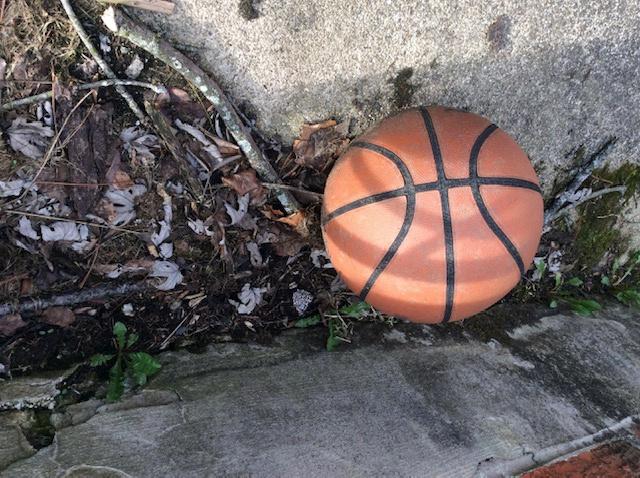
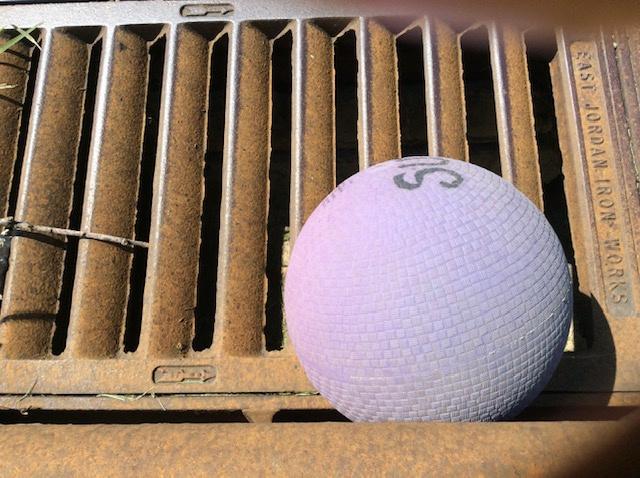
Shulamit Adler is a writer, a visual artist, photographer, community educator, and neuro- and clinical psychologist. Her celebration of the Midwest lyrical flower images, joyful people, and animals with attitude appear in shows, installations, publications and private collections around the region.
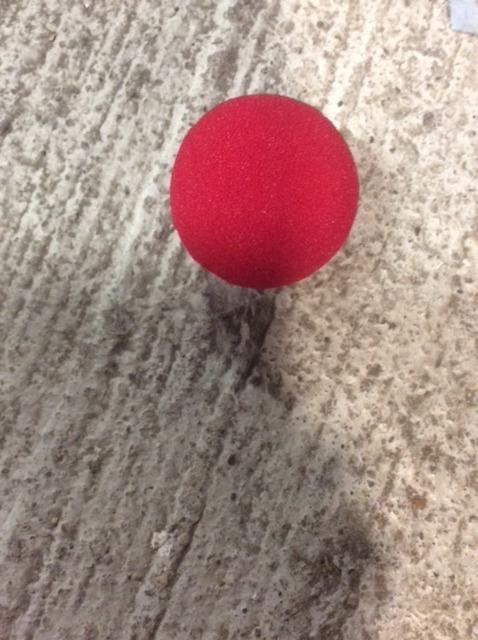
A R T W O R
L I B R A R Y Z I N E ! • 2 0 2 2 I S S U E • 3 3
Hands

Anika Sinha, Age 6
All of my family holding hands together
A R T W
O R K
L I B R A R Y Z I N E ! • 2 0 2 2 I S S U E • 3 4
Anika Sinha, Age 6
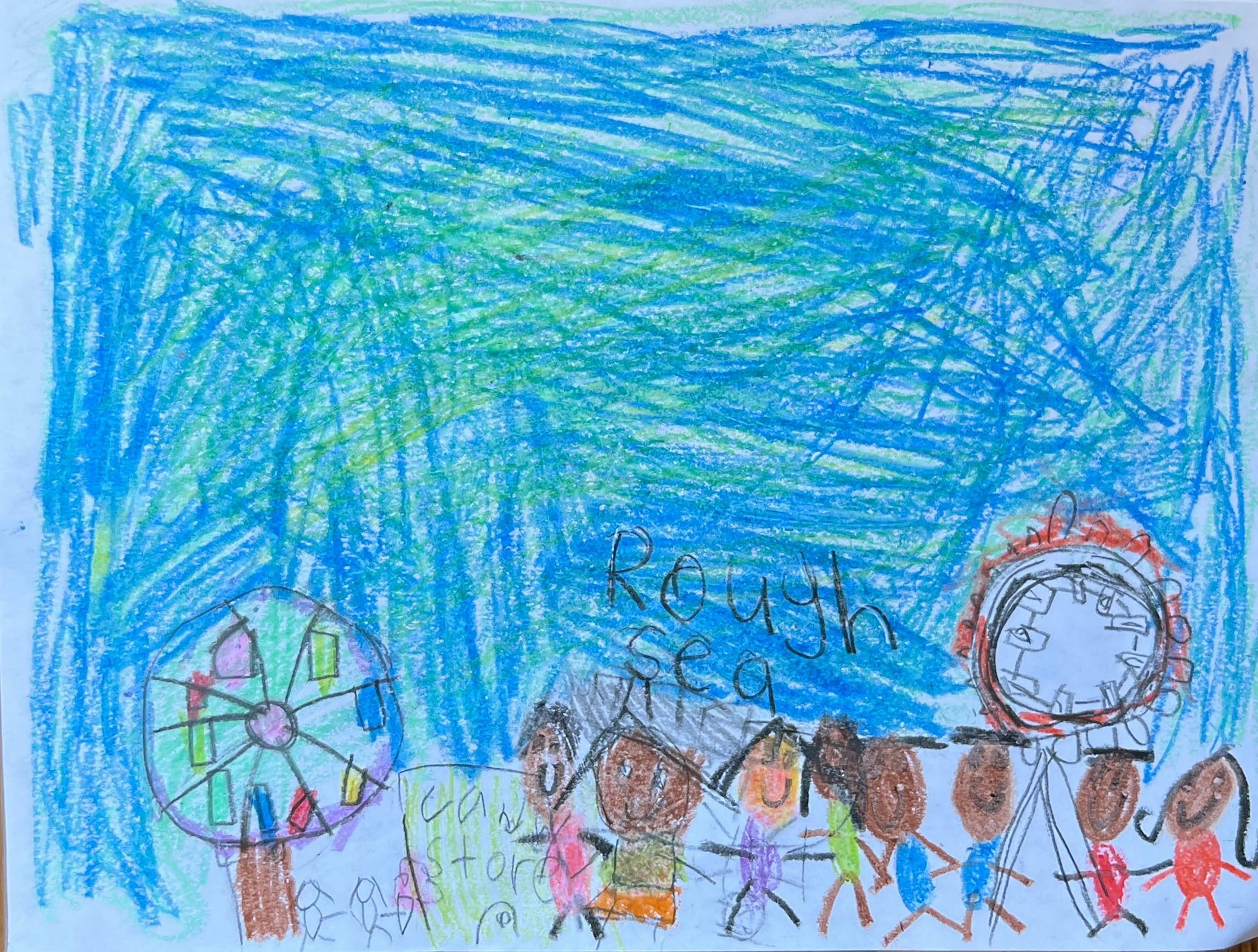
I wanted to make a picture of my family who are the most important people in my life.

Days at the County Fair
I was happy that I was able to go on the rides and eat cotton candy at the county fair
A R T W O R K
Together
L I B R A R Y Z I N E ! • 2 0 2 2 I S S U E • 3 5
Isolation NY

Min Edmonds
Stained glass panel, 30cm x 30cm
KThe last two years have been very challenging, particularly as I lost my job as a School Librarian due to Covid. Whilst job searching, I managed my stress and anxiety by listening to music and designing and making stained glass.
I found again my love for the music of Joy Division and the lyrics to Isolation seemed more haunting and pertinent than ever before I am now back between the stacks of a new library, but this panel will serve as a reminder of a very difficult period for me and for us all.
A R T W O R
L I B R A R Y Z I N E ! • 2 0 2 2 I S S U E • 3 6
Harvesting the Blues
Jasmine Chen
I never could harvest the hydrangeas in the garden where the ones I admired played. Where someone like you frolicked. I’d never do it well. I’d never gather enough for the Winter until Spring brings new others. I wonder how you do it, if you ever think twice of it? So. I’ll learn how to approach you, to speak to you, to exchange histories and prophecies with you. Best of all, I’ll learn to capture the scent of the wind, as it is now, knowing, soon, I’ll have to learn to pass by you. I’ll learn how to harvest the bundles of buds with you If you could forgive my inadequacies as I am now Ultimately, I’ll learn how to wander to the next garden, with what songs I’ve sung with you, to collect lilies before the next again. But it’s all only what I’ve imagined, unless I start to learn now. I’m sure I’d rather lay in front of a fan and worry less about your garden dance. But I know when the hydrangeas wilt, I'd regret missing the harvest.
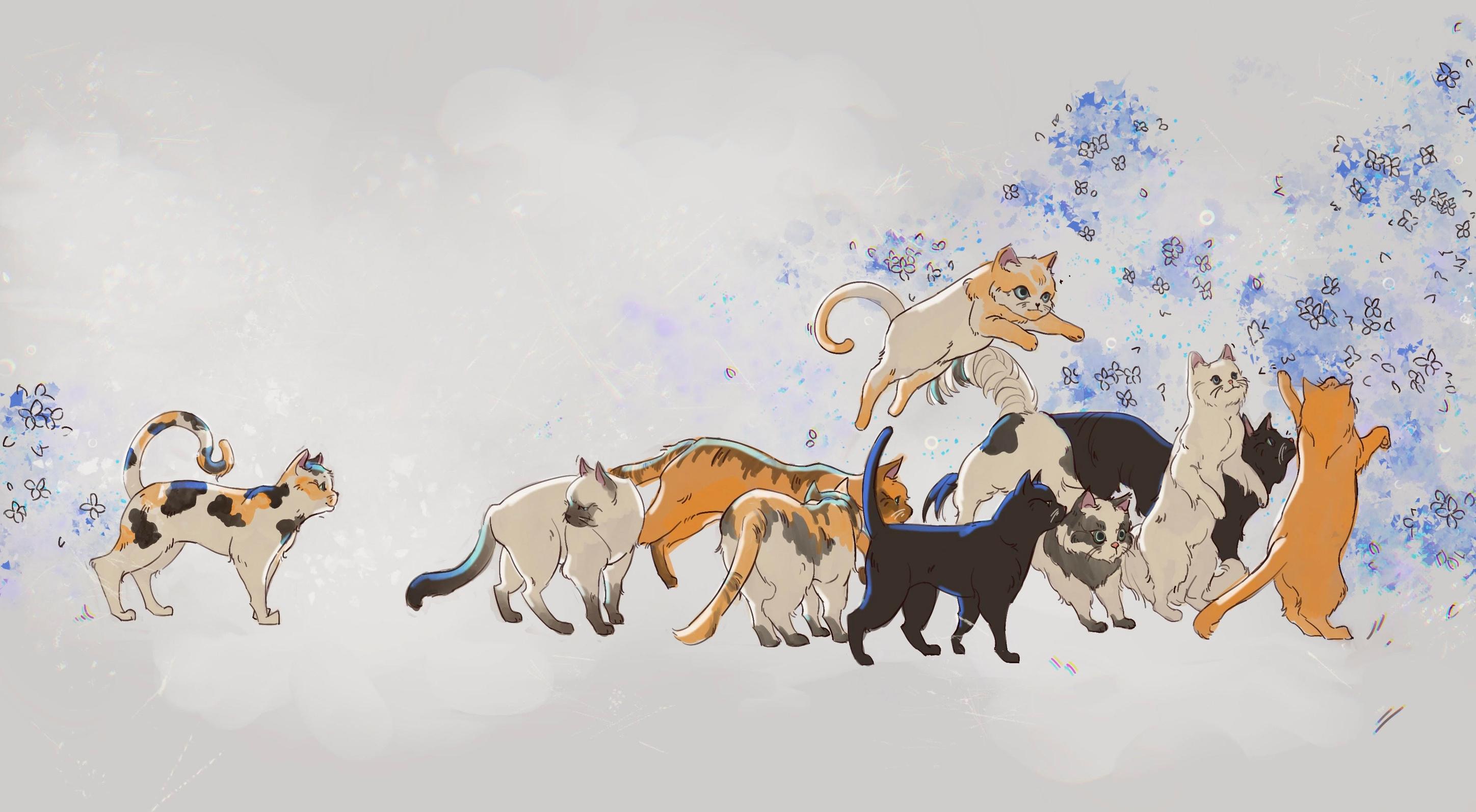
A R T W O R K
L I B R A R Y Z I N E ! • 2 0 2 2 I S S U E • 3 7
Past. Present. Future. Zoe Welch
I love to take to the skies. I always have. I think it’s the freedom. The floating. Something close to being in the water when none is near. Lately, as I fly back and forth, I realize I’m totally unaware of what comes next. (Maybe I never did and just never noticed.) Knowing this is terrifying. I’m old enough now (61) to understand this Old enough for it to matter I don’t tell anyone
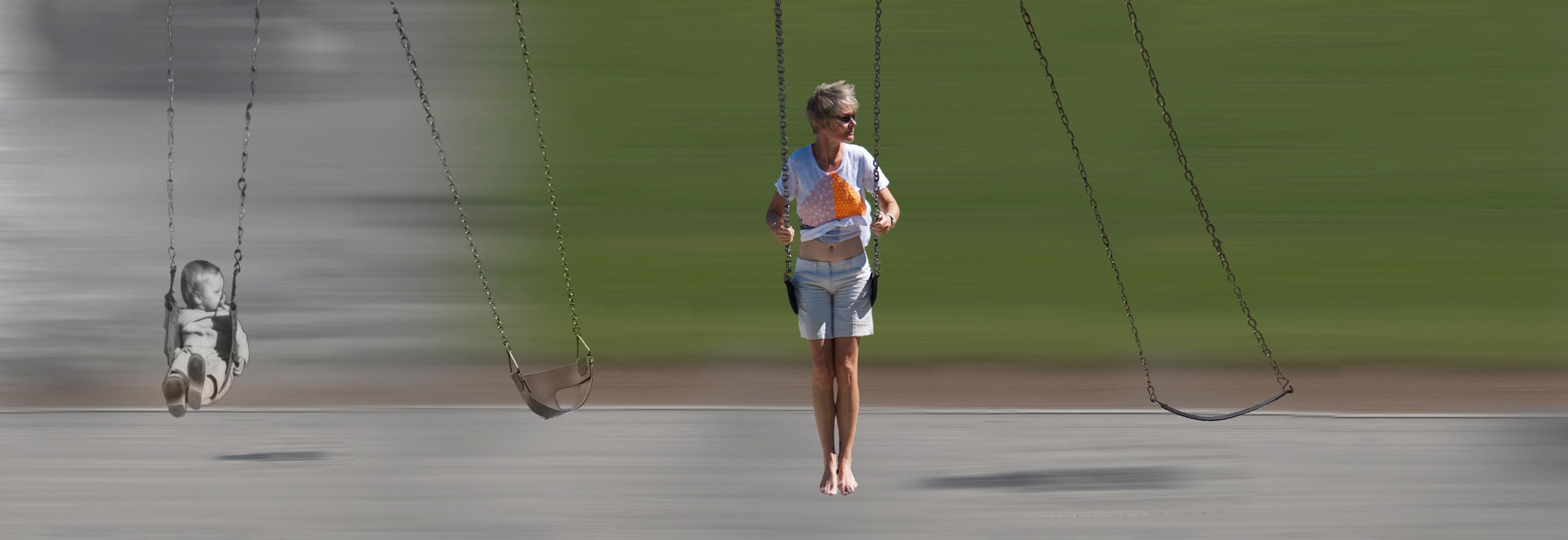
A R T W O R K
L I B R A R Y Z I N E ! • 2 0 2 2 I S S U E • 3 8
Juliana Roth
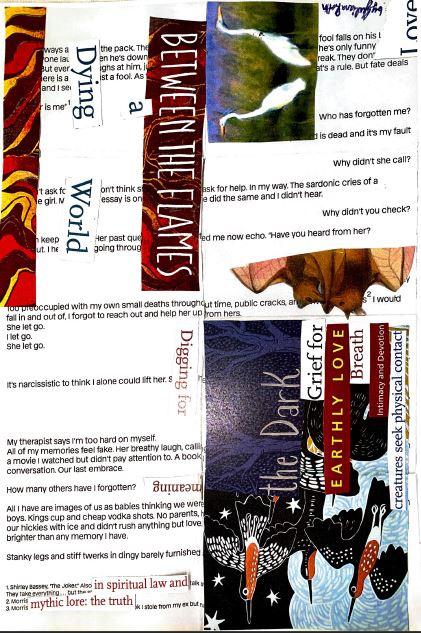
A R T W O R K Love
L I B R A R Y Z I N E ! • 2 0 2 2 I S S U E • 3 9
Juliana Roth
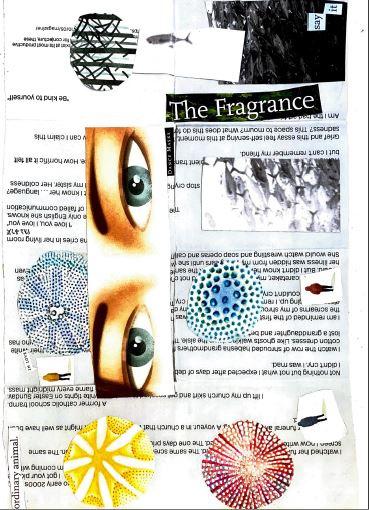
A R T W O R K Love
L I B R A R Y Z I N E ! • 2 0 2 2 I S S U E • 4 0
Love Juliana Roth
Love is a collage zine I created in the spring of 2022 using materials from the Swiss Institute's Real Madrid show and cutouts from Orion Magazine from 2020-21. This period of time represented a reimagination of the possibilities of love, my own barriers to receiving it, and my draw to the mythic. Through creating the text, I found myself feeling a deeper connection to the ways we come together and part over time as a species on earth--from a cellular level to the full scope of the universe.
A R T W O R K
L I B R A R Y Z I N E ! • 2 0 2 2 I S S U E • 4 1
Lost & Found
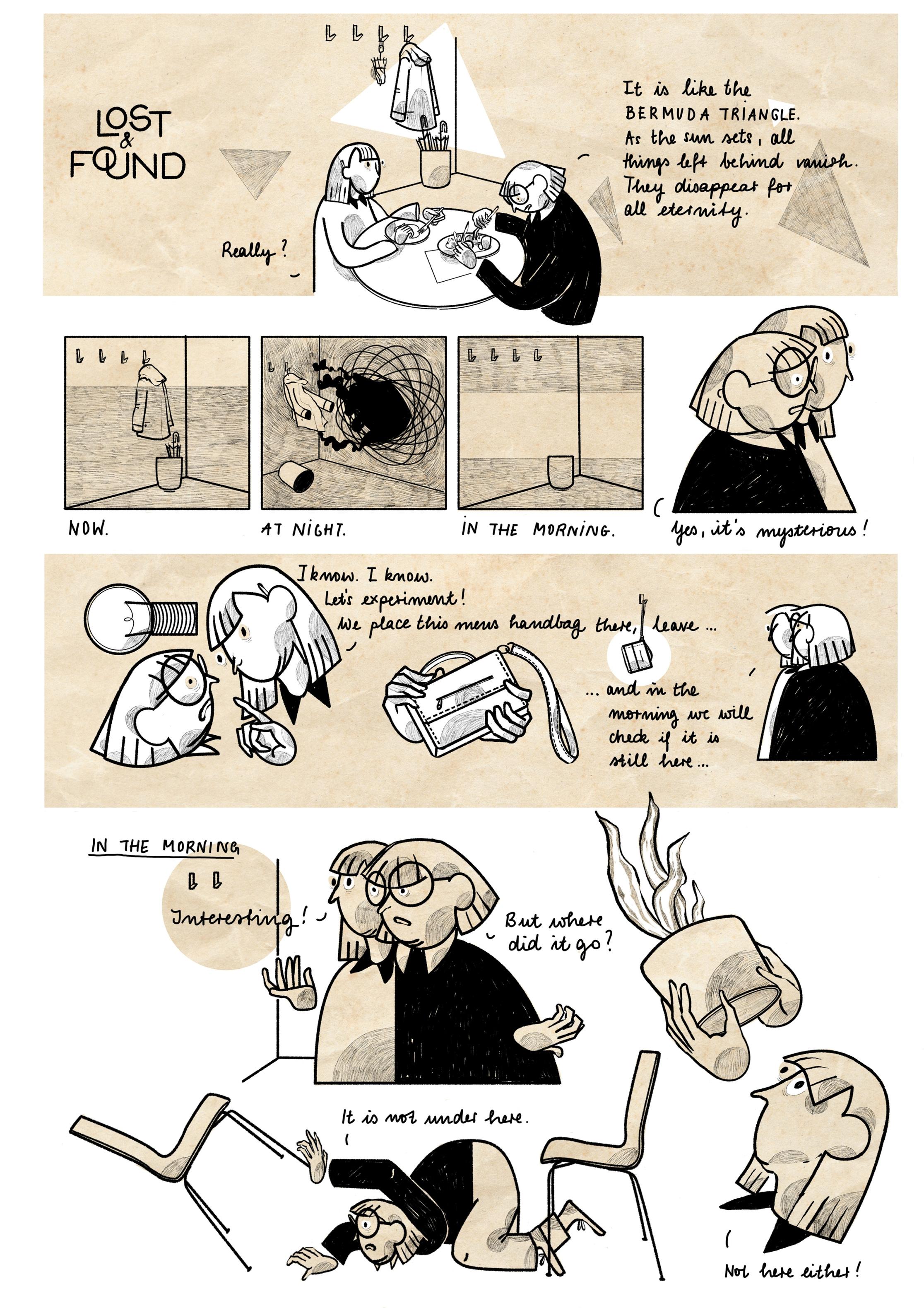
Susan Hoppner
A R T W O R K
L I B R A R Y Z I N E ! • 2 0 2 2 I S S U E • 4 2
Lost & Found Susan Hoppner

A R T W O R K
L I B R A R Y Z I N E ! • 2 0 2 2 I S S U E • 4 3
Lost & Found
Susan Hoppner
This is a short comic about two friends finding out about the “Lost&Found” and about what can be retrieved there and what may never be found again. It is a reminder that we should never lose sight of people close to our hearts. (Based on a million true stories.)
Susan is an amateur cartoonist from Germany
A R T W O R K
L I B R A R Y Z I N E ! • 2 0 2 2 I S S U E • 4 4
ABOUT LIBRARY ZINE: VOICES FROM ACROSS NYPL
the Editors, learn
the next theme and how to keep
to date with Library Zine: Voices from Across NYPL!
Meet
about
up
Four librarians—Whitney Davidson-Rhodes, Adena Gruskin, Tabrizia Jones, and Karen Loder—came together with the idea to start a publication that celebrates the artistry of the New Yorkers. They applied for and won The New York Public Library's 2017 Innovation Project, which is made possible by a generous grant from the Charles H. Revson Foundation. Liz Baldwin and Victoria James have since joined this initiative to form what is now the New York Public Library Zine Committee. Meet the editor’s for The New York Public Library’s literary magazine, Library Zine!
Liz Baldwin is an Adult Services Librarian at the Stavros Niarchos Foundation Library. She loves Zines and has been reading Zines, writing Zines, and attending Zine fests for over ten years. She loves how Zines allow people to tell their own stories like so few other mediums can. She's very excited to see what the patrons of the New York Public Library can create and how those pieces can come together in a collaboration.
Whitney Davidson-Rhodes is a Young Adult Librarian in the Bronx. Though an upstate transplant, she’s found a home in this bustling big city. Whitney was previously on an art gallery committee that showcased original work from LGBTQ artists from the tri-state area. With a background and passion in art and literature, she’s always wanted to produce work that showed off the talents of the people in her community. She’s lucky to have found other people who shared the same goals.
Adena Gruskin is an Adult Librarian in Manhattan. While she has been published before, this is her first time working on a Zine and she is very excited to get to see her fellow New Yorkers’ creativity firsthand. An avid reader and writer, Adena is thrilled to have the opportunity to work on this zine with colleagues who share her passions. She is particularly excited about this project because it provides a showcase for our talented patrons and beautiful city.
M E E T O U R E D
I T O R S
L I B R A R Y Z I N E ! • 2 0 2 2 I S S U E • 4 6
D I T O R S
Victoria James is an Adult Services Librarian with The New York Public Library. She holds an MLIS with a focus in Indigenous Librarianship and additionally has a BA in Global Studies and Social Justice. She has served on LGBTQ+ committees and worked with community organizations that speak out against violence against women. Victoria hopes to continue to speak up and empower others to share their stories through Zines. Although she is Canadian, she is learning to call New York home.
Tabrizia Jones is a Young Adult Librarian in the Bronx. As someone who was born and raised in the Bronx, she has seen the great things that make New York a creative and vibrant city. What better way to display that creativity than in a magazine that celebrates New York! Tabrizia has participated with literary magazines and newspapers in high school, both working on them and submitting to them. In her spare time, she loves to write short stories and poems, do art, and of course, read!
ABOUTLIBRARYZINE
The Innovation Project’s mission is to expand our horizons by surfacing and supporting staff ideas and creativity throughout NYPL. We aim to break down barriers, to imagine the impossible, to support and encourage each other, and to create a culture of “Yes! Let’s try that!”
The Innovation Project is part of an innovation landscape at NYPL which, along with the Innovation Communities, provides pathways for exploration and experimentation with the aim of improving our programs, services, and processes in ways that advance our mission and strategic priorities. NYPL staff bring smart, creative expertise to their roles in every corner of our organization and are often closest to understanding what innovative ideas might align with that aim. If you are a staff member with an innovative idea, this project can help bring it to life.
The Innovation Project Team is made up of staff from across the Library, including past awardees, to ensure representation of the entire system. All staff will have a voice in the process, by submitting their ideas, voting, or both. Also importantly, this process will expose staff to each other’s projects, which we hope will in turn spark more ideas and conversation across the system.
M E E T O U R E
L I B R A R Y Z I N E ! • 2 0 2 2 I S S U E • 4 7
Near…far…wherever you are.
It’s not just the beginning of a famous song, it's how we had to form our connections with our family and friends during the pandemic. If there is one thing that lockdowns have shown us, it is that there are many ways to connect with people. Even though we have resumed some kind of normalcy, the new ways of connection is not something that should be forgotten. That is what we like to know from you! How do you stay connected? What old or new ways have you found to connect with the world?
Answer these questions and more in our 2023 Zine theme: Stay Connected. This theme is centered around how we are staying connected in this “new normal.” Although these past few years have been difficult for many, don’t feel limited to addressing current events. The Zine Committee is looking for creative and unique takes on how we stay connected in the world we live.

N E X T I S S U E
Call for work to begin February 2023! L I B R A R Y Z I N E ! • 2 0 2 2 I S S U E • 4 8
G U I D E L I N E S
Manuscripts
All written manuscripts must be typed in 12-point font with one-inch margins, and checked for spelling and grammar. At the top of your submission, please include your name, address, primary phone number, and email.
Poetry should be single-spaced and not exceed 1,000 words. Short stories can be 500-2,250 words, about 2-8 pages double-spaced.
Non-fiction and essays should not exceed 2,250 words, about 8 pages double-spaced. Nonfiction/Essays should be about a book you have read that impacted your future/current self. No other topics will be accepted at this time.
Manuscripts must be in .doc or .docx format, and/or readable in Google Drive and/or Microsoft Word.
Submissions can be written in any language.
Artwork and photography
Physical copies of artwork (e.g. paintings, sculptures, etc.) or photos will not be accepted. Instead, take a full-frame picture or scan your work into one of the following formats: .JPG/JPEG, .TIFF, and .PNG. Images must be 300 pixels per inch (PPI). Images containing nudity will not be accepted.
Along with your image, attach a separate Word document with a description of your work and a short anecdote of what inspired the work. Any images included in the artwork must be the artist’s original work and not under copyright of another party or entity.
Please Be Aware
While Library Zine does not want to limit our patrons’ creativity, be aware that this publication is intended for all audiences. Submissions must be mindful of language, the use of graphic violence and abuse, and the depiction of harmful stereotypes based on age, race, religion, gender, sexual orientation, and mental/physical disabilities.
Limit of 5 submissions for review per person, no guarantee that any or all will be selected.
S U B M I S S I O
N
L I B R A R Y Z I N E ! • 2 0 2 2 I S S U E • 4 9

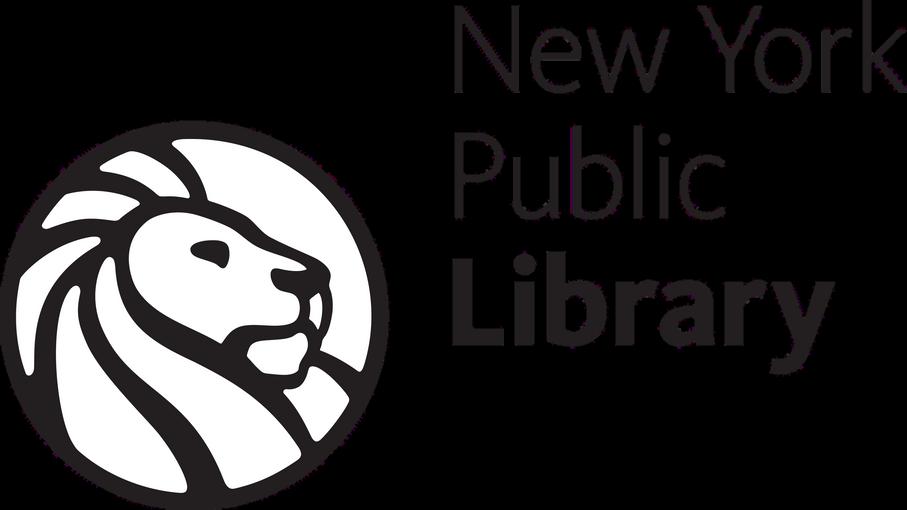
O U R W E B S I T E Visit Our Website To Read Past Issues, Find Out Current Submissions, Up to Date Programs and So Much More! THANK YOU FOR READING! www.bit.ly/LibraryZine L I B R A R Y Z I N E ! • 2 0 2 2 I S S U E • 5 0






















